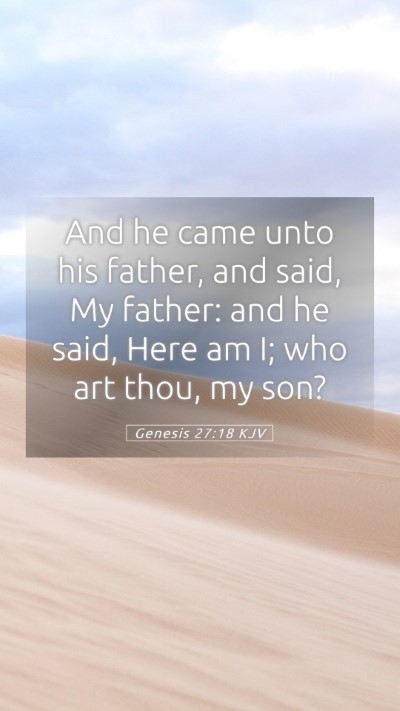Understanding Genesis 27:18
Genesis 27:18 states:
"And he came unto his father, and said, My father: and he said, Here am I; who art thou, my son?"
This verse depicts a crucial moment in the narrative surrounding Isaac and his sons, Jacob and Esau, highlighting themes of deception and family dynamics. Below is a comprehensive analysis derived from public domain commentaries.
Bible Verse Meanings and Interpretations
Genesis 27:18 serves as a pivotal moment where Jacob approaches his blind father Isaac to receive the blessing intended for Esau. This act of deception is central to the unfolding drama between these siblings.
Key Themes
- Deception: Jacob's act of impersonating Esau emphasizes the human inclination toward deceit, especially when motivated by ambition or desire. It reflects the lengths to which individuals may go to secure a perceived advantage.
- Identity: The question posed by Isaac, "Who art thou, my son?", underscores the importance of identity within familial relationships. Jacob's response reveals the complexities of his character and the conflict with his brother for identity and blessing.
- Parental Bonds: The interaction captures the strained yet intimate relationship between fathers and sons, marked by both trust and betrayal.
Commentary Insights
Matthew Henry Commentary
Henry remarks on the significance of Jacob's concern to deceive, noting that the blessing was a vital element meant for the rightful heir. He highlights the moral complications of Jacob's actions, suggesting that while he desired the blessing, the method of obtaining it calls forth ethical considerations.
Albert Barnes Commentary
Barnes emphasizes Jacob's calculated approach in approaching Isaac. He points out that Jacob's statement, "My father," signifies a lie as he engages in a self-serving action driven by his mother's encouragement. Barnes views this as illustrative of the conflict between familial duties and personal ambition.
Adam Clarke Commentary
Clarke delves into the historical and theological ramifications of this event, seeing Jacob not merely as a deceiver but as a pivotal character through whom God's purposes are fulfilled. He notes that divine sovereignty overrules human actions, thus framing the narrative within a broader theological context.
Bible Study Insights
Understanding Genesis 27:18 requires a multi-faceted approach, recognizing the cultural, historical, and theological implications of Jacob’s deception.
- In Bible study groups, this passage can spur discussions on ethics in family dynamics and making morally sound decisions.
- Online Bible study resources may suggest examining the cultural context regarding blessings and inheritance in ancient times.
- Bible study tools like commentaries and lexicons can help deepen understanding of specific words and phrases within the text.
Application of This Verse to Daily Life
When interpreting Genesis 27:18, one can draw contemporary applications regarding honesty and integrity in family relationships. The challenges Jacob faced resonate with individuals today as they navigate complicated family dynamics and personal ambitions.
Related Bible Cross References
- Genesis 27:1-17 - The context of Esau's blessing, highlighting the deceit.
- Genesis 25:29-34 - The initial conflict between Jacob and Esau regarding the birthright.
- Malachi 1:2-3 - A reflection on God's love for Jacob and hatred for Esau, interpreted through the lens of their story.
Conclusion
Genesis 27:18 invites a deeper reflection on the moral complexities faced by its characters. Through engaging with various Bible verse interpretations, readers can uncover the significance of Scripture and apply its lessons to their lives. This passage serves as a powerful reminder of the importance of integrity and the consequences of our actions within the family unit.


